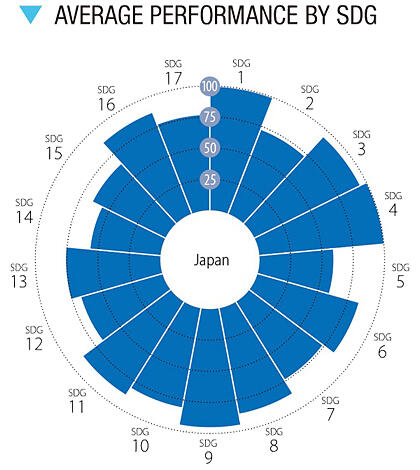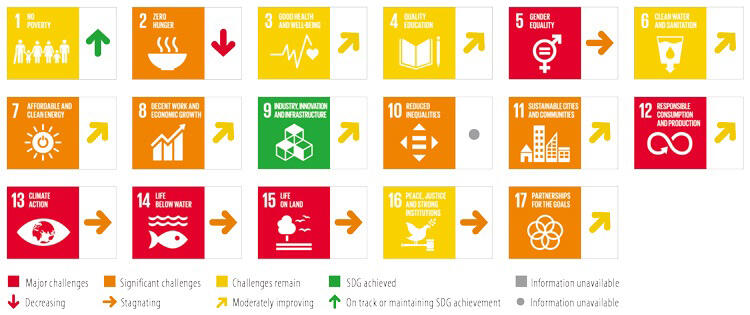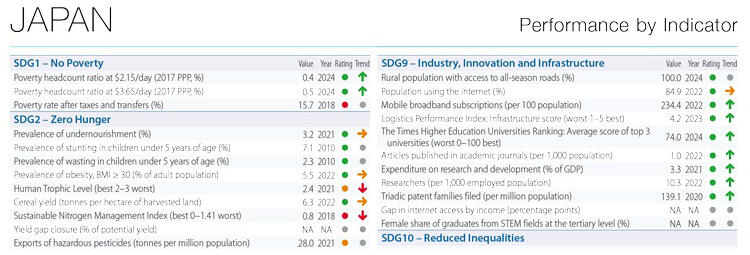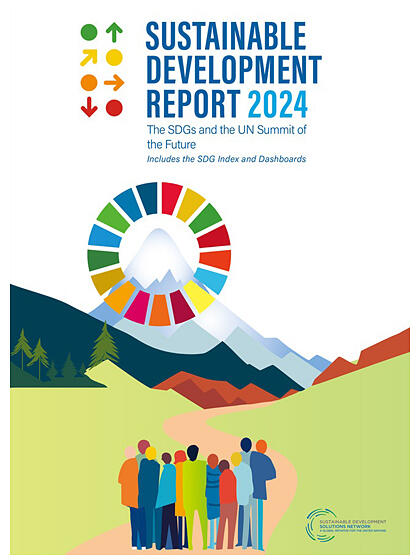Only 16% of the targets of the United Nations "Sustainable Development Goals (SDGs)" are on track to be achieved, and Japan ranks 18th in the world in terms of achievement. The "Sustainable Development Solutions Network (SDSN)," an international organization headed by Jeffrey Sachs, released its "Sustainable Development Report 2024," evaluating each country's progress toward the SDGs. The SDSN expressed a sense of crisis regarding the current state of the world. Japan moved up three ranks from its record low ranking of 21st the previous year; however, it continued to receive the lowest rating for five of the 17 goals, including gender equality.

Provided by SDSN
The report rates each of the 17 goals on a four-point scale from "Achieved" to "Challenges Remain;" "Significant Challenges Remain;" and the lowest rating, "Major Challenges Remain."
Japan maintained its relatively high ranking this year, with a score of 79.9 for achievement across all goals, increasing slightly from 79.4 in the previous year, and 18th out of 167 countries. However, it was judged to have the lowest rank of "Major Challenges Remain" in five goals, namely, Goals 5 "Gender equality," 12 "Responsible consumption and production," 13 "Climate action," 14 "Life below water," and 15 "Life on land."
The only goal that was "Achieved" was Goal 9, "Industry, innovation, and infrastructure." Six goals, including 2 "Zero hunger" and 7 "Affordable and clean energy," were rated the second worst rank: "Significant Challenges Remain."

Provided by SDSN
Under gender equality (Goal 5), the low percentage of women in the National Diet and the gender wage gap were identified as problems. Climate change measures (Goal 13) identified high carbon dioxide emissions from fossil fuel combustion, while production and consumption (Goal 12) identified high exports of plastic waste. Marine environmental protection (Goal 14) indicated that fishing methods, such as trawling, negatively affect the marine ecosystem.

Provided by SDSN
Finland was first in the world in terms of achievement with a score of 86.4. Sweden and Denmark came in second and third with scores of 85.7 and 85.0, respectively. The top countries were European countries, with the U.S. in 46th place (score 74.4) and China in 68th (70.9).
Regarding the progress of the SDGs globally, the report states, "On average, only 16% of the goals are on track to be met globally by 2030, with the remaining 84% showing limited progress or a reversal of progress. Progress is still extremely slow and varies across countries." In particular, the report expressed concern that Goal 2, "Zero hunger;" Goal 11, "Sustainable cities and communities;" and Goal 16, "Peace, justice, and strong institutions" are "off track."
The report adds that "the Nordic countries continue to lead in achievement, while the poorest and most fragile economies lag far behind" and the top-ranked countries, including European countries, "face significant challenges on several targets," and called for improvement.
The report further noted that "at the current rate, 600 million people worldwide will suffer from hunger until 2030. Nevertheless, obesity is on the rise" and that the state of food supply and land use remain serious issues. It notes that sectors related to agriculture and forestry account for approximately a quarter of the world's greenhouse gas emissions and emphasizes the critical importance of emission reduction measures.
The SDGs are goals that the 193 United Nations member states aim to achieve by 2030. Adopted at the UN Summit in 2015, the SDGs share the common principle of "Leave-No-One-Behind." The Japanese government established the SDGs Promotion Headquarters in 2016. Companies, local governments, and others are also taking their own initiatives.
Global SDG efforts stalled with the spread of COVID-19 from 2020. Since then, wars and conflicts, such as Russia's invasion of Ukraine, continue to divide the international community. Frequent extreme weather events associated with global warming have caused substantial damage. In September 2023, the UN held a summit-level meeting on the SDGs and adopted a political declaration confirming, among other aspects, that achievement of the goals is critical and that countries must act urgently.
The SDSN was established in August 2012 by then UN Secretary-General Ban Ki-moon. The SDSN aims to identify and share the best approaches to achieve a sustainable society with the participation of research institutions, businesses, and civil society organizations from different countries. Since 2016, the SDSN has analyzed a vast amount of data on each country's efforts and level of achievement and has published an "SDG Index" that scores the results on a 100-point scale. SDSN Japan (chaired by Norichika Kanie) was established in 2015 as a hub organization in Japan.

(courtesy of SDSN)
Original article was provided by the Science Portal and has been translated by Science Japan.




